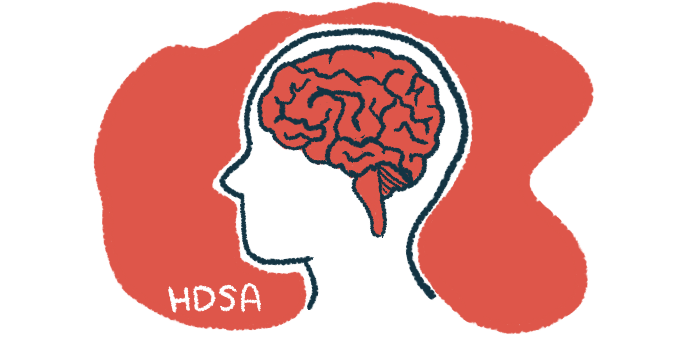HDSA 2024: Talk therapy can help to navigate life with Huntington’s
With right therapist, it's way to 'investigate and address' daily challenges
Written by |

Psychotherapy — talk therapy with a professional to help a person manage their emotional state and mental health — can be of benefit to people with Huntington’s disease, though finding the right therapist can require some “shopping around.”
That’s according to Spencer Diehl, a licensed clinical social worker/therapist at Vanderbilt University Medical Center who’s spent the last few years working with Huntington’s patients.
Diehl discussed the ins and outs of psychotherapy in Huntington’s during an oral presentation at last week’s Huntington’s Disease Society of America (HDSA) annual convention. The presentation was titled “Therapy 101: Understanding Therapy and Finding the Right Fit.”
Periods of stress or grief ‘particularly a part’ of Huntington’s disease
At its core, the idea of psychotherapy — sometimes also known, simply, as therapy — is the act of talking through one’s thoughts and feelings with a professional trained to help, such as a psychologist, a social worker, or a psychiatrist.
“We should expect in therapy that the professional, whoever your therapist is, has a knowledge that’s relevant to what you want to address, and the skill to take care of you with that,” Diehl said, adding that the therapeutic relationship is essentially “an agreement to investigate and address life’s difficult experiences together.”
There are many reasons someone might seek out therapy, ranging from persistent emotional problems like stress or anxiety, to difficulties with relationships or major life transitions.
“If anyone’s ever experienced a period of grief or depression or anxiety, sometimes it’s difficult for us to get off of a certain idea that can just feel like it’s weighing you down. … This is a part of life in general, right? But this is particularly a part of HD [Huntington’s disease],” Diehl said.
“We have friends and family that we never actually get into those kind of underneath things that we’re like: ‘Oh, this is something I’ve been carrying around that sits deeply within me that I don’t talk about all the time,’” Diehl added. That’s when talk therapy may help.
While “there’s minimal research that’s been done in HD on what types of therapies are specifically relevant,” Diehl said, psychotherapy can be a key component of helping families navigate life with the disease.
He noted that patients sometimes have the misconception that, because Huntington’s itself changes the brain’s biology, talk therapy won’t be effective. But living with a chronic disease comes with mental and emotional challenges beyond the disease’s biological effects.
“All of the cascading experiences, all of the things that surround that change, are also part of that experience,” Diehl said.
Talk therapy with a professional comes in many forms
Although the stereotypical image of therapy usually involves one person laying on a couch while a therapist asks them questions and scribbles on a notepad, Diehl stressed that modern psychotherapy is a lot more flexible.
Therapy can be done one-one-one or with multiple people, in-person or virtually. And different types of therapy can be considered for HD.
Cognitive behavioral therapy (CBT) is a well-established form of psychotherapy that focuses on changing unhelpful or unhealthy patterns of thinking, feeling, and behaving. Acceptance and commitment therapy (ACT) helps people to accept situations they cannot control and focus their time on things they value most, while dialectical behavioral therapy is more focused on mindfulness and emotion regulation.
Today, there are lots of ways to find a therapist. But Diehl encouraged people affected by Huntington’s to look on the HDSA website for resources that can help them connect with therapists who are knowledgeable about the disease.
When entering into therapy for the first time, Diehl emphasized that it’s important to try to be honest — even about the unpleasant parts of oneself.
“This is the place to show all the things that are not the best sides of us,” Diehl said. “The therapist will best be able to assist if they really know what’s going on.”
Any reputable therapist should provide their clients with clear policies about confidentiality, Diehl said. In general, therapists cannot legally talk about things that are discussed during therapy without the client’s express permission. The only exceptions are if the person poses a danger to themselves or others, or if a court issues a subpoena.
Important to find a therapist who is both comforting and able to push
Therapists will often ascribe their clients with psychiatric diagnoses like major depressive disorder and generalized anxiety disorder, but these labels are not value judgements or descriptions of character, Diehl emphasized. They are simply labels, ways of referring to mental health symptoms that tend to respond to certain types of treatment.
From a practical point of view, these diagnoses likely are important for insurance to help cover the cost of therapy and related services.
But finding a good therapist is an individualized process where “you get to shop around,” Diehl said, adding: “When it comes to therapists, don’t settle.”
An ideal therapist will be friendly enough to make the client feel comfortable, but also willing to push where necessary, Diehl noted.
It is crucial that patients are direct and honest with therapists, including clearly communicating if something is or isn’t working. “You’re talking to somebody that you are paying to be there. So sharing with them, this thing works for me, this thing doesn’t … you’re the expert in your own life,” Diehl said.
Note: The Huntington’s Disease News Today team is providing virtual coverage of the Annual Huntington’s Disease Society of America Convention (HDSA) May 30-June 1. Go here to see the latest stories from the conference.

